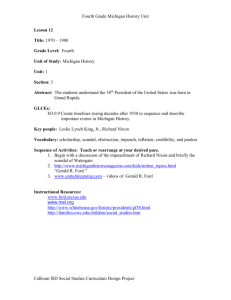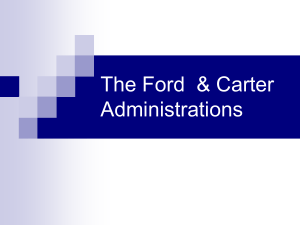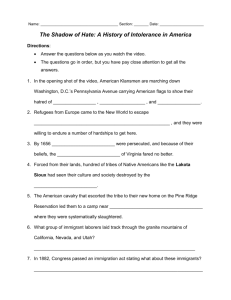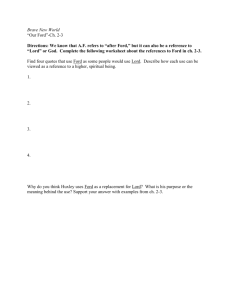Ford's decision to pardon Richard Nixon for any crimes that he might
advertisement
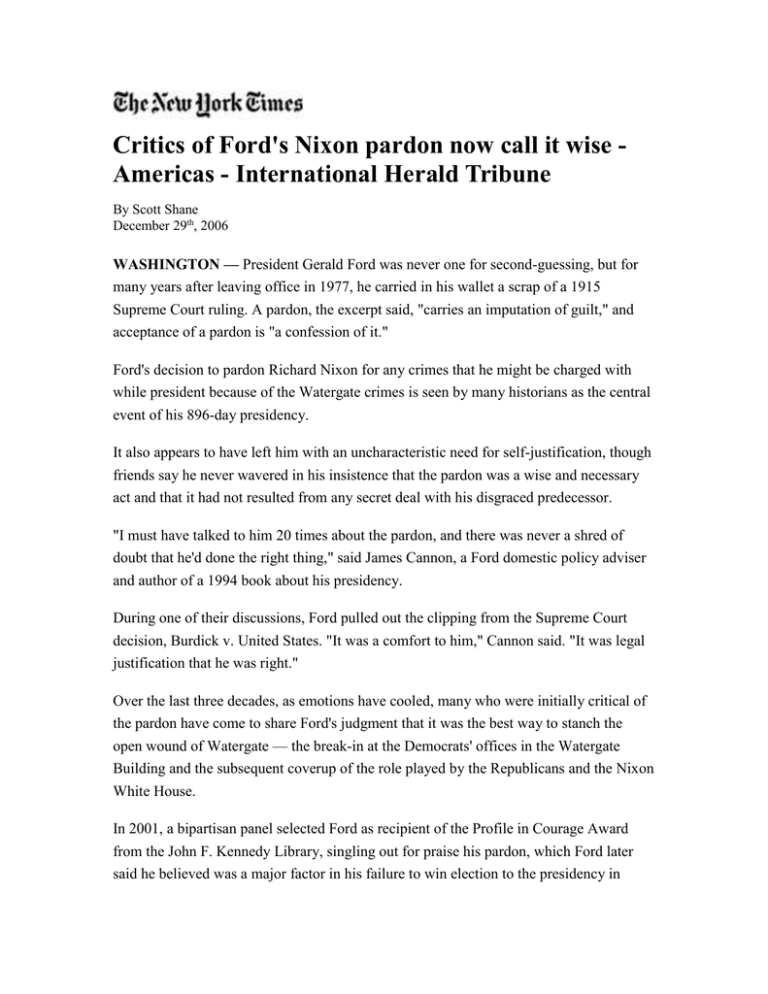
Critics of Ford's Nixon pardon now call it wise Americas - International Herald Tribune By Scott Shane December 29th, 2006 WASHINGTON — President Gerald Ford was never one for second-guessing, but for many years after leaving office in 1977, he carried in his wallet a scrap of a 1915 Supreme Court ruling. A pardon, the excerpt said, "carries an imputation of guilt," and acceptance of a pardon is "a confession of it." Ford's decision to pardon Richard Nixon for any crimes that he might be charged with while president because of the Watergate crimes is seen by many historians as the central event of his 896-day presidency. It also appears to have left him with an uncharacteristic need for self-justification, though friends say he never wavered in his insistence that the pardon was a wise and necessary act and that it had not resulted from any secret deal with his disgraced predecessor. "I must have talked to him 20 times about the pardon, and there was never a shred of doubt that he'd done the right thing," said James Cannon, a Ford domestic policy adviser and author of a 1994 book about his presidency. During one of their discussions, Ford pulled out the clipping from the Supreme Court decision, Burdick v. United States. "It was a comfort to him," Cannon said. "It was legal justification that he was right." Over the last three decades, as emotions have cooled, many who were initially critical of the pardon have come to share Ford's judgment that it was the best way to stanch the open wound of Watergate — the break-in at the Democrats' offices in the Watergate Building and the subsequent coverup of the role played by the Republicans and the Nixon White House. In 2001, a bipartisan panel selected Ford as recipient of the Profile in Courage Award from the John F. Kennedy Library, singling out for praise his pardon, which Ford later said he believed was a major factor in his failure to win election to the presidency in 1976. Ford, who died Tuesday at the age of 93, was defeated as the Republican candidate then by the Democratic nominee, Jimmy Carter. Few dramas in American political history remain more riveting than that of the exit of the embattled Nixon and Ford's reaction, at first halting and then decisive, to the looming possibility of a former president on criminal trial for months on end. "At the time, I thought this was going to cause a problem with the public and the press, and of course it did," said Robert Hartmann, a former Ford aide who recalled in an interview the tense Oval Office atmosphere when the new president told top staff members of his decision. "I thought he was right. But it's also important to be seen as right and remembered in history as having done the right thing." The contradictions raised by the pardon were evident when Ford announced it on Sept. 8, 1974. "I deeply believe in equal justice for all Americans, whatever their station or former station," Ford said. A moment later he made clear that Nixon would not face equal justice. "My conscience tells me clearly and certainly that I cannot prolong the bad dreams that continue to reopen a chapter that is closed," he said, though the major Watergate trials for Nixon's aides were still months away. In the resulting firestorm, many Americans asked why, in return for a pardon, Ford had not at least demanded an admission of wrongdoing from Nixon or a statement of remorse. The pardon drama had begun a few weeks earlier, with a visit to Ford, who was then vice president, from Alexander Haig, Nixon's chief of staff. Haig informed Ford that White House tapes would soon prove Nixon's role in the Watergate coverup and outlined several alternatives for Nixon's departure. He handed Ford two pieces of paper — a description of the presidential power to pardon and a blank pardon form. Ford later said that he had given no definitive answer. But when he described the meeting to his aides, they were alarmed at the implication: that Nixon, through Haig, might be offering Ford the presidency in return for a pardon. "We didn't want a situation where he'd agreed to a pardon and there would be an appearance of a quid pro quo," said John Marsh, a former congressman who had become a top aide to Ford. Haig has often denied that he was making any kind of a "sleazy approach," as he put it in an appearance on CNN. "The president never, never was offered a deal," he said. Ford, too, in his memoir and in interviews, said that he did not believe that Haig had explicitly offered a trade of the presidency for a pardon. But his aides feared the meeting would be viewed in the worst light. "There was a strong naïve streak in Jerry Ford," Cannon said. "He didn't always see the danger in things." Cannon said that Ford later told him that he had destroyed the two papers Haig had given him. Nixon resigned a week after Haig's visit, and Ford was sworn in as president on Aug. 9. An accumulation of policy troubles confronted the new president, Marsh recalled. "We were coming out of the Arab oil embargo," Marsh said. "The economy was going sour. We were in the wind- down of the Vietnam War, and that was a bad situation." Meanwhile, he said, "Watergate was affecting everything." At his first news conference, on Aug. 28, reporters pressed Ford on Nixon's fate, and his answers were ambiguous. Until any charges were filed against Nixon, he said, "I think it is unwise and untimely for me to make any commitment." Afterward, Ford was furious at the way the news conference had gone, Cannon said. "He felt he'd bungled it royally," Cannon added. "He told me he just sat there fuming for two days, and then he decided on the pardon." Why President Ford Pardoned Richard Nixon October 17th, 1974 In this speech before the Congressional Subcommittee on Criminal Justice, of October 17, 1974, President Gerald Ford explains his decision to pardon former President Richard Nixon for his role in the Watergate scandal. Nixon had resigned on August 9, 1974, and Ford pardoned his disgraced predecessor a month later, on September 8. When Ford appeared before the subcommittee to explain the controversial pardon, he asserted that his purpose in granting it was “to change our national focus. . . to shift our attentions from the pursuit of a fallen President to the pursuit of the urgent needs of a rising nation.” Ford noted that while Nixon had not requested the pardon, “the passions generated” by prosecuting him “would seriously disrupt the healing of our country from the great wounds of the past.” Ford declared that “the general view of the American people was to spare the former President from a criminal trial” and that sparing Nixon from prosecution would “not cause us to forget the evils of Watergate-type offenses or to forget the lessons we have learned.” EXCERPT “My appearance at this hearing of your distinguished Subcommittee of the House Committee on the Judiciary has been looked upon as an unusual historic event - - one that has no firm precedent in the whole history of Presidential relations with the Congress. Yet, I am here not to make history, but to report on history. The history you are interested in covers so recent a period that it is still not well understood. If, with your assistance, I can make for better understanding of the pardon of our former President, then we can help to achieve the purpose I had for granting the pardon when I did. That purpose was to change our national focus. I wanted to do all I could to shift our attentions from the pursuit of a fallen President to the pursuit of the urgent needs of a rising nation. Our nation is under the severest of challenges now to employ its full energies and efforts in the pursuit of a sound and growing economy at home and a stable and peaceful world around us. We would needlessly be diverted from meeting those challenges if we as a people were to remain sharply divided over whether to indict, bring to trial, and punish a former President, who already is condemned to suffer long and deeply in the shame and disgrace brought upon the office he held. Surely, we are not a revengeful people. We have often demonstrated a readiness to feel compassion and to act out of mercy. As a people we have a long record of forgiving even those who have been our country’s most destructive foes. Yet, to forgive is not to forget the lessons of evil in whatever ways evil has operated against us. And certainly the pardon granted the former President will not cause us to forget the evils of Watergate-type offenses or to forget the lessons we have learned that a government which deceives its supporters and treats its opponents as enemies must never, never be tolerated.”
